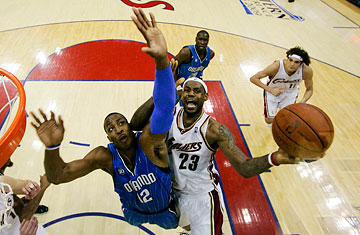
The Cleveland Cavaliers' LeBron James, right, goes up for a basket next to the Orlando Magic's Dwight Howard in the NBA Eastern Conference final playoff game on May 22, 2009
Huang Jianhua's given name means "building China," but the sports promoter, who goes by the English name Ken, may be more interested in building U.S. basketball. According to basketball sources, the Chinese-born Huang is brokering a deal between the Cleveland Cavaliers and a Hong Kong real estate and telecommunications conglomerate called New World Development to buy up to a 15% minority stake in the National Basketball Association (NBA) franchise and its sports arena. The Cavs, who are currently battling the Orlando Magic for the Eastern Conference title, boast this season's most valuable player, LeBron James, who's known in the U.S. as "King James" and in China as "the Little Emperor." (Watch TIME's video "LeBron James: Leader of the Redeem Team.")
The potential deal still has to be approved by the NBA's board of governors. But it's no secret that the NBA has been looking for a way to cash in on basketball fever in China. With the emergence of Yao Ming as an All-Star center for the Houston Rockets — he's the league's tallest player at 7 ft. 6 in. — basketball has become the sport of choice for China's urban youth. More than 50 Chinese TV stations carry NBA games, and viewership in China topped 1 billion last season, according to the NBA. Dozens of magazines are dedicated to covering U.S. hoops, following the exploits of the Little Emperor, the Little Flying Warrior (Kobe Bryant), Stone Buddha (Tim Duncan) and German Racecar (Dirk Nowitzki). (Watch TIME's video "A Free Lesson With: Kobe Bryant.")
But in many ways, the China market is still more hype than lucrative reality. With the exception of the likes of Shaquille O'Neal, who has signed on with Chinese sporting company Li Ning, most NBA superstars aren't pitching Chinese products. (Foreign companies like Nike and Coca-Cola, however, have had success using NBA pitchmen in China, particularly last year when the country was wrapped up in Olympic fervor.) Pirating of NBA jerseys and other basketball paraphernalia is so rampant in China that it cuts into profits for the U.S. league. And even though China boasts its own professional basketball league, the market is so tightly controlled by the state that it's tough for foreign investors to make a foray into Chinese hoops.
That explains why Huang, who has partnered with Chicago-based sports-industry consultant Marc Ganis to broker deals between Chinese sports companies and U.S. sports teams, is a mystery man to many in the Chinese sports world, while he's considered something of an up-and-comer in U.S. industry circles. Ganis and Huang helped Rockets owner Leslie Alexander buy a stake in Chinese sportswear firm Anta for its successful initial public offering two years ago. But that comprador work is minor compared with the Cavs deal, which would rank as the biggest international sporting investment by a Chinese–Hong Kong consortium if it goes through. "It makes sense for the Chinese to look for business in the States, because that's where the investment opportunities are," says Terry Rhoads, managing director of Zou Marketing, a sports-branding consultancy based in Shanghai. "It'll be interesting to see what happens, because the Chinese are going to want to understand the way that American basketball is run, and maybe they can bring some of those lessons back home to apply to Chinese basketball." (See pictures of street basketball in China.)
Chinese basketball needs all the help it can get. Talented players like Yao or the New Jersey Nets' Yi Jianlian tend to go abroad at the first opportunity. Games back in the Chinese Basketball Association league are uninspiring, hampered by poor coaching and a system focused more on rote drills than innovative play. Street play has picked up in recent years in Beijing and Shanghai, but that has yet to translate into a flood of dynamic national players. Despite its home-court advantage in Beijing last year, the Chinese Olympic hoops team made it only to the quarterfinal round before getting trounced by Lithuania.
That leaves more time for Chinese fans to soak up the glories of the NBA. Indeed, some sports analysts are wondering whether a China connection — and with it, potentially huge endorsement contracts — will be enough for James to consider staying put in Cleveland, as he may become a free agent next year. Although Cleveland is his hometown and it boasts a successful franchise, it's a second-tier basketball town, without the financial resources of cities like New York or Los Angeles. Certainly, the New World Development–led consortium must be hoping that the Little Emperor won't leave Cleveland. Otherwise, the value of the Emperor's clothes — both real and knockoff — will plummet in China.
